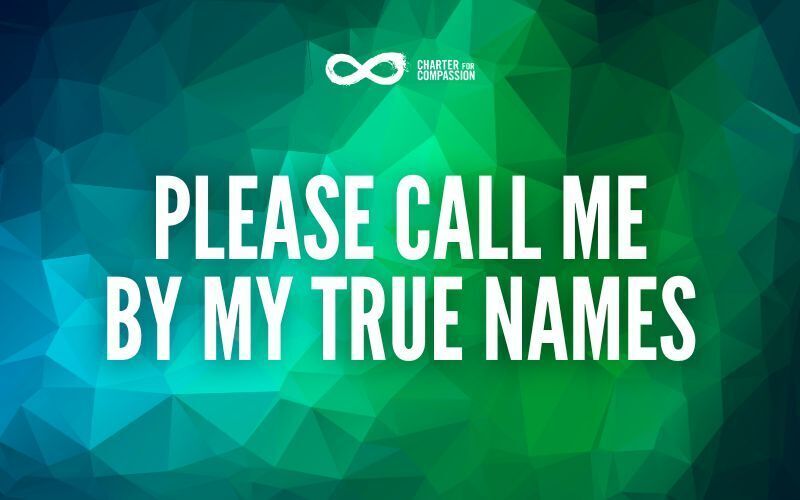
The last Saturday of every month, the Charter holds a Sangha (circle) with Orla O'Sullivan, education coordinator at Plum Village, the retreat center founded by the late master Thich Nhat Hanh. Spending ninety minutes in Sangha, which you are most welcome to join, is sacred. We often laugh, sit in silence and comfort, and sometimes find ourselves responding to a motivating poem and, in the case of a poem, reflecting on how we interpret its meaning. A few sessions back, Orla introduced us to the master's poem, "Please Call Me By My True Names." I remember hearing this poem years ago and how deeply it touched me as it did when Orla read it to us.
Thinking about it, I'm certain that each person who hears it will likely associate its meaning with their own life experience. I'm reminded of a student who had become a colleague. One day, the phone rang in our office, and the caller asked for someone whose name I didn't know, and said so out loud. A co-worker called hesitantly across the room," That's me." We had called her for years by an incorrect name. There was obviously a story there, her story to offer and ours to receive. Thich Nhat Hanh's poem belongs to each of us allowing ourselves to walk in the world in our own reality.
He wrote Please Call Me By My True Names after receiving a letter in which a story was told of a young girl, a refugee on a boat, who threw herself overboard after she had been raped by a pirate. Thich Nhat Hanh later shared, "When you first learn of something like that, you get angry at the pirate. You naturally take the side of the girl. As you look more deeply, you will see it differently. If you take the side of the little girl, then it is easy. You only have to take a gun and shoot the pirate. But we cannot do that. In my meditation, I saw that if I had been born in the village of the pirate and raised in the same conditions as he was, there is a great likelihood that I would become a pirate…. If you or I were born today in those fishing villages, we too might become sea pirates in twenty-five years. If you take a gun and shoot the pirate, you shoot all of us, because all of us are, to some extent, responsible for this state of affairs." In essence, not only am I me, but I am also the young girl. And not only am I the young girl, I am also the pirate. He goes on to ask: "Can we look at each other and recognize ourselves in each other?" This is our challenge, my challenge of wondering how I should approach a person with whom I worked and called another name or all of our challenges to see how we might be a part of those whom we may shun or turn our backs on. Below is an excerpt from the poem. However, it deserves to be read in its entirety.
Don't say that I will depart tomorrow—
even today I am still arriving.
Look deeply: every second I am arriving
to be a bud on a Spring branch,
to be a tiny bird, with still-fragile wings,
learning to sing in my new nest,
to be a caterpillar in the heart of a flower,
to be a jewel hiding itself in a stone.
I still arrive, in order to laugh and to cry,
to fear and to hope.
The rhythm of my heart is the birth and death
of all that is alive.
I am the twelve-year-old girl,
refugee on a small boat,
who throws herself into the ocean
after being raped by a sea pirate.
And I am also the pirate,
my heart not yet capable
of seeing and loving.
Please call me by my true names,
so I can hear all my cries and laughter at once,
so I can see that my joy and pain are one.
Please call me by my true names,
so I can wake up
and the door of my heart
could be left open,
the door of compassion.
With warm regards,
Marilyn Turkovich


